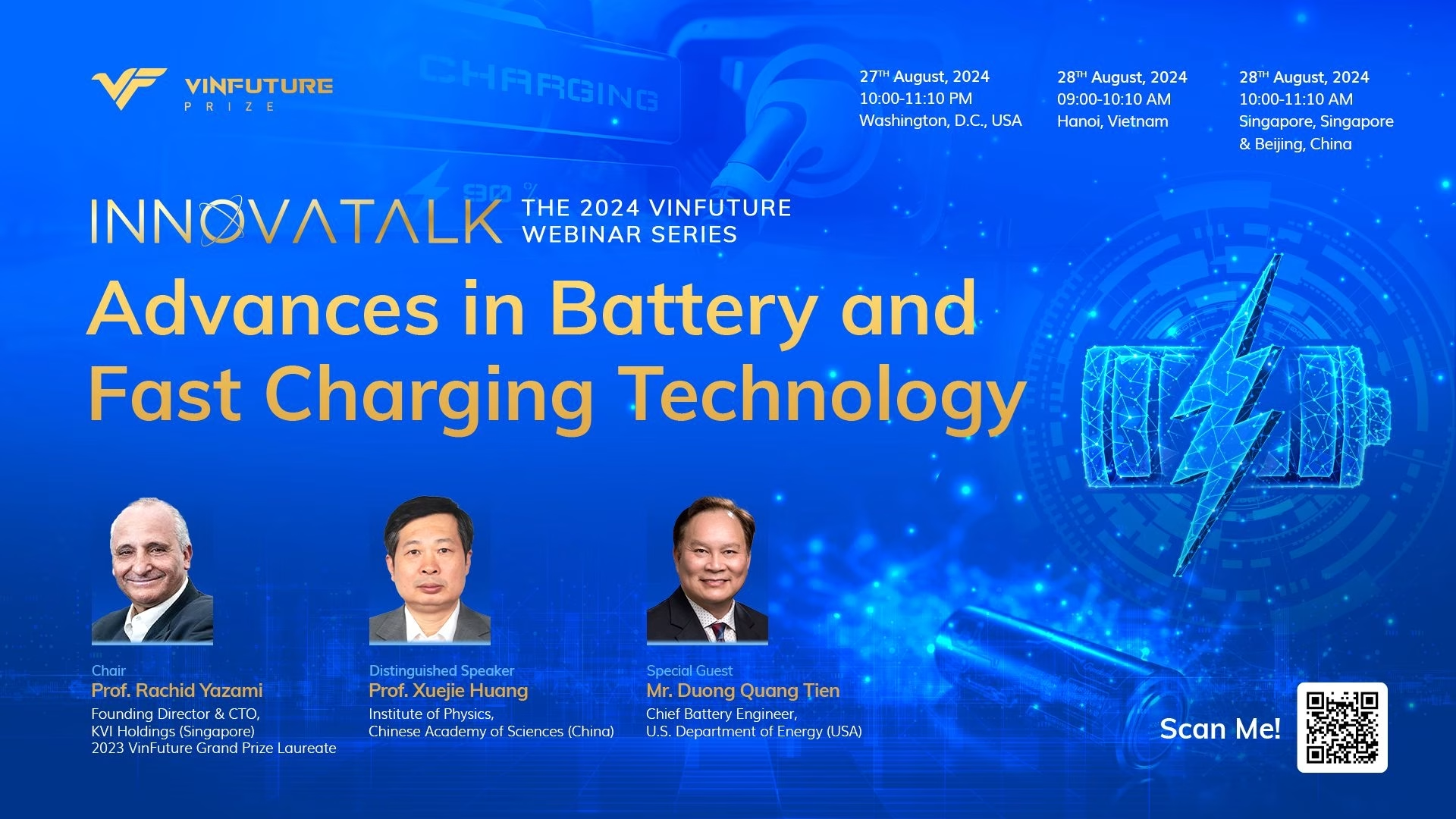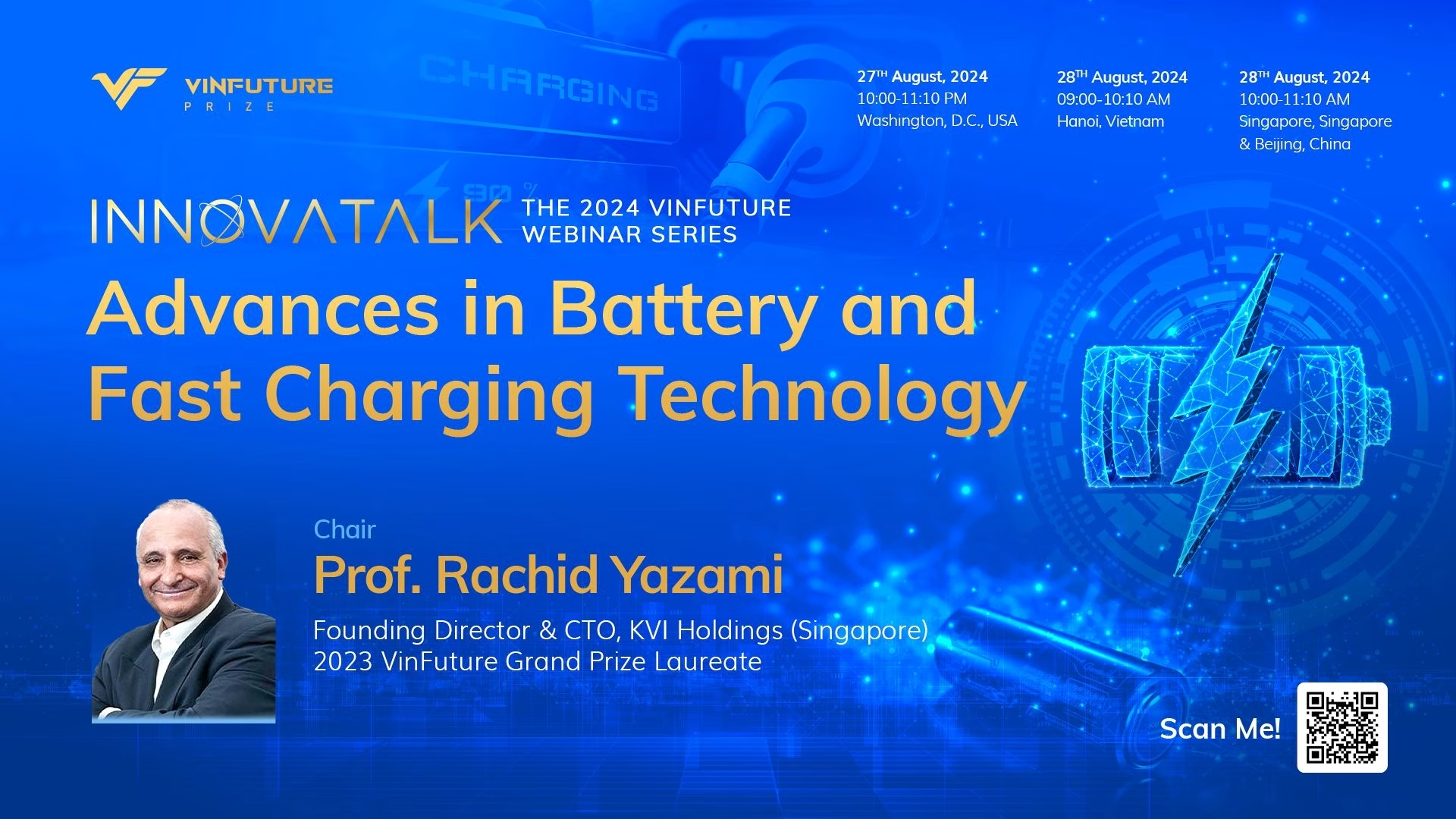Challenges and Solutions in Battery Technology
Professor Rachid Yazami, Founding Director and CTO of KVI Holdings (Singapore), the 2023 VinFuture Grand Prize Co-Laureate, highlighted the current limitations of Lithium-ion batteries (LIBs), the most prevalent battery technology today. He pointed out that while LIBs have seen significant advancements over the years, challenges remain.
One of the major concerns is safety. Lithium-ion batteries can overheat and even explode under certain conditions, raising safety concerns for users. Professor Yazami underscored the paramount importance of battery safety and advocated for the development of battery technologies that are not only efficient but also unequivocally safe.
Moreover, long charging times are a significant drawback of Lithium-ion batteries. Currently, it can take several hours to fully charge an electric vehicle, causing inconvenience for users. Professor Yazami emphasized that extended charging times pose a significant barrier to the widespread adoption of electric vehicles. He highlighted the need for solutions to reduce charging times to a level comparable to the refueling process of traditional vehicles.
Professor Yazami also pointed out the rapidly increasing demand for Lithium-ion batteries, especially with the booming global electric vehicle market. He predicted that the demand for LIBs would reach 4,700 GWh by 2030. This presents a significant challenge but also a tremendous opportunity for scientists and engineers to develop new, efficient, and sustainable battery technologies.
To address these challenges, Professor Yazami introduced a new charging technology based on Non-Linear Voltammetry (NLV). This technology promises faster charging without compromising battery lifespan, significantly improving the user experience. Professor Yazami stressed the pivotal role of NLV technology in addressing the fast-charging challenges for Lithium-ion batteries. He expressed confidence that this technology would be instrumental in promoting the development of electric vehicles and other energy applications in the future.
New Materials Upgrading Lithium-ion Batteries
Professor Xuejie Huang, a leading battery expert from the Institute of Physics, Chinese Academy of Sciences, presented exciting information about new materials being developed to upgrade Lithium-ion batteries. He emphasized that the search for and development of new materials is key to unlocking the true potential of battery technology, leading to higher performance, safety, and sustainability.
One current research focus is developing next-generation cathode materials. Professor Huang introduced NCM90, an advanced cathode material with higher energy density, improved thermal stability, and greater mechanical strength compared to traditional cathode materials. With higher energy density, batteries using NCM90 would provide a longer driving range for electric vehicles while improving safety and battery lifespan.
Furthermore, Professor Huang’s presentation mentioned the use of silicon in the anode of Lithium-ion batteries. Silicon has a much higher lithium storage capacity than graphite, the traditional anode material, and can significantly increase the battery’s energy density. However, silicon also faces challenges in terms of durability and stability during charging and discharging cycles. Professor Huang stated that researchers are working diligently to address these challenges and believe that silicon will play a crucial role in developing next-generation Lithium-ion batteries.
In addition to cathodes and anodes, scientists are also researching new materials for electrolytes and other battery components. The goal is to create batteries with higher performance, improved safety, longer lifespan, and greater environmental friendliness.
Electrode Design and Thermal Management: The Foundation for Fast Charging Technology
Mr. Duong Quang Tien, Chief Battery Engineer at the U.S. Department of Energy, provided an in-depth look at the challenges and solutions related to fast charging and electrode design. He emphasized that while fast charging offers time-saving benefits, it also poses stringent technical requirements for battery design, particularly in terms of electrodes and thermal management.
Mr. Duong remarked that fast-charging would be an exciting challenge. When charging speed is accelerated, lithium plating and dendrite growth could potentially impact battery performance and lifespan severely. Lithium plating occurs when lithium accumulates unevenly on the anode surface during fast charging, leading to reduced performance and even short circuits. Dendrite growth, a phenomenon where lithium forms needle-like structures that penetrate the electrolyte, can also cause short circuits and damage the battery.
To address these issues, Mr. Duong proposed several technical solutions. The first is to reduce the tortuosity of the electrodes, promoting a more even distribution of current and reducing the risk of lithium plating. The second is to improve the electrolyte to enhance lithium-ion conductivity and prevent dendrite growth. Finally, the use of model-informed fast-charging protocols allows for precise control of the charging process and minimizes negative impacts.
Besides electrode design, thermal management also plays a crucial role in ensuring the safety and efficiency of fast charging. Fast charging generates a significant amount of heat, which can raise the battery temperature and lead to safety concerns. Mr. Duong emphasized the importance of developing effective thermal management systems to control battery temperature during fast charging. According to Mr. Duong, effective thermal management is key to achieving safe fast charging and extending battery lifespan.
Additionally, Mr. Tien mentioned the use of simulation tools and artificial intelligence (AI) to aid in electrode design and thermal management. These tools can help researchers and engineers optimize battery design, predict potential problems, and develop more effective solutions.








